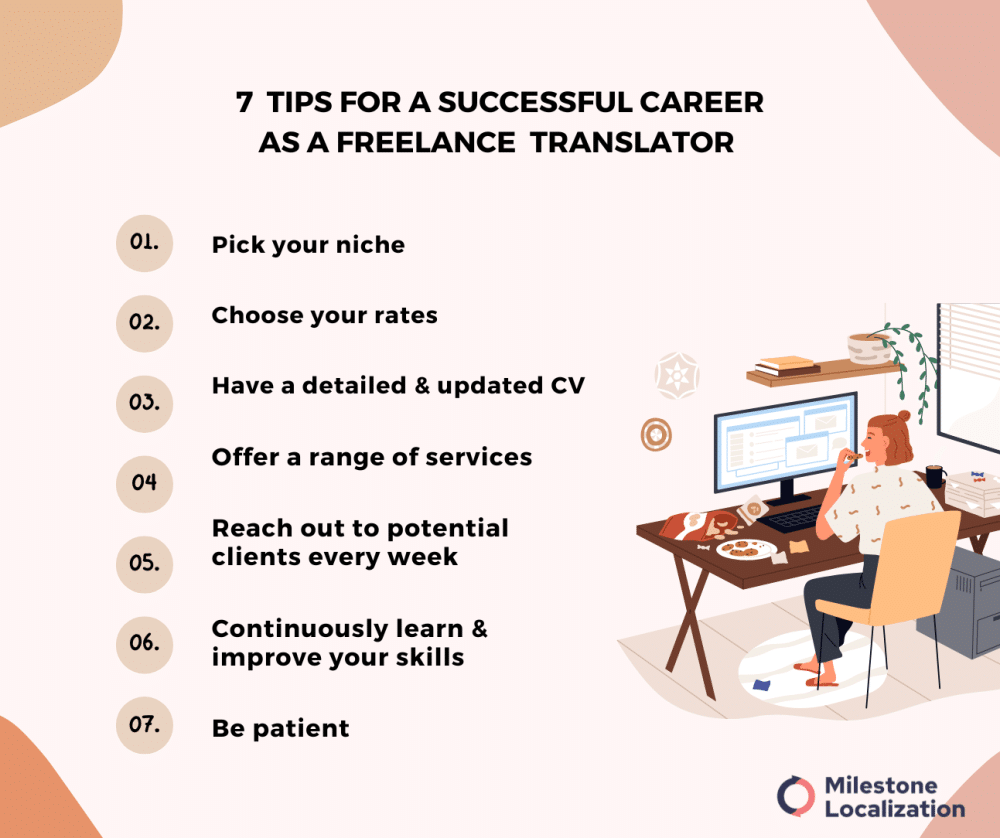In the world of freelance translators, there is fierce competition for jobs. There are linguists out there who are much better qualified than you. There is always someone out there willing to do a job for a cent lower than you. Nevertheless, you should keep your head up. We have your back!
Here is a list of 7 practical tips a freelance translator can use to navigate the localization industry and get their first few projects:

Pick your niche
A great way to start your career is by finding a field in which you would like to work. In fact, most well-paid translators usually have a degree in another subject such as law, medicine, marketing, engineering, etc.
However, if your expertise is in linguistic and translation, it is best to consider your interests and hobbies. Since we tend to know more about things, we are interested in, picking a favorite subject of yours indicates you already have sufficient knowledge on the subject.
Specialising in one or two subjects will make you a stand-outSpecializinglinguistics candidate for projects in your field. As you gain experience, you can leverage this to develop long-term relationships with companies and command higher rates.
Choose your rates
When deciding how much you want to charge your clients, it is very important, to be honest with yourself.
How much do you expect to earn? How many hours are you willing to devote to work? What is the rate range for your language pair?
Furthermore, it is a common misconception that inexperienced translators should undersell themselves to land a job.
In reality, most companies will be more than happy to pay a higher price even to an inexperienced translator for high-quality work.
Have a detailed CV
Having more experience will definitely attract clients. Augmenting your qualifications with an impeccably prepared resume is paramount. Utilize a reputable online CV maker to ensure your linguistic and translation skills are showcased most effectively, catering exactly to those niches you’re passionate about. Include all jobs you have undertaken as well as some recommendations.
Tip: Don’t leave out the bad reviews! Contrary to your expectations, bad reviews could land you a job offer since they indicate you are honest and trustworthy.
Looking For More Information On Freelancing In the Language Industry?
Offer a range of services
To get more projects, you can offer a range of services other than translation. This can include review, proofreading, machine translation post-editing, interpretation, transcription, and subtitling. Big projects often have to be translated, reviewed, and proofread- so you can bid for all three rounds instead of just one!
Put yourself out there
It is vital for your success to find clients and the Internet makes it easier than ever before. The easiest thing would be to register on sites such as UpWork, ProZ, and Translatorscafe. After setting up your profile you can’t simply wait with bated breath for new clients- you have to actively respond to job posts and bid on projects.
LSPs allow you to submit your application to be a part of their network. If approved, this can be a great way to get work. It also looks good on your CV. You can register to be a part of our translator network here
Most importantly, don’t get discouraged if clients don’t respond right away. As you gain more experience, your reputation will grow which in turn would inevitably attract more clients.
Learn, learn, learn
Once you have chosen your niche, start looking for courses, workshops, and other opportunities to improve your skills. Certificates and diplomas are a great addition to your CV. Additionally, taking courses would show your clients you take your job seriously. You can learn new skills such as subtitling or do courses on proofreading.
Most LSPs require a freelance translator to work on a CAT tool – learning all the major ones (Trados, Memesource, memoQ, and SmartCAT) can help you land more jobs. Some of them are quite pricey but there are plenty of free ones (eg. Omega T) where you can learn the basics.
Also read: CAT Tool -Features & Benefits- Why Every LSP & Translator Should Use One
Be patient!
On average it takes over a year to become a full-time freelance translator. In the meantime, you could always opt for a job at a translation agency. Don’t forget that building a portfolio and establishing yourself among all the competitors does not happen overnight. Nevertheless, if you’re willing to work hard, you will reap the benefits in due time!
Good Luck!
To be a part of our translator network, register here
Looking For More Information On Freelancing In the Language Industry?
Read our report to discover interesting data derived from the survey, tips from industry experts and language professionals, and more!




